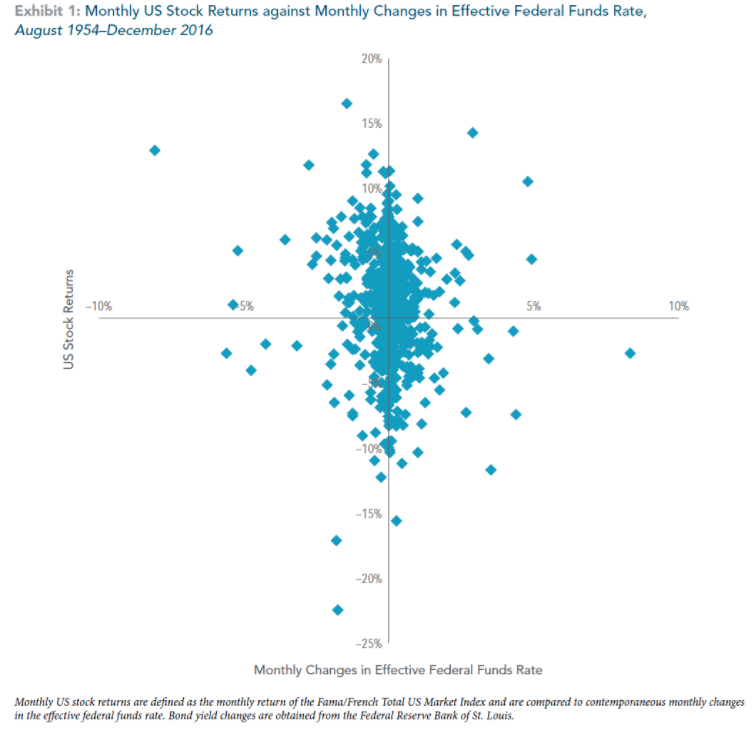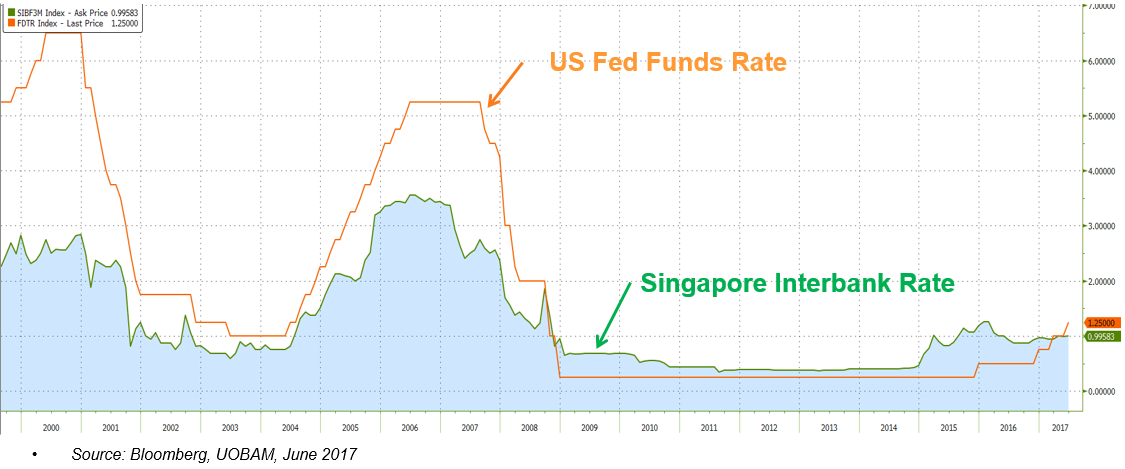Rates Are Going Up, Do Stocks Go Down?
11 August 2017

For 2017, the Federal Reserve has indicated that it could raise base interest rates by three times. Assuming that each rate hike was 25bps, we are potentially looking at a 75bps increase this year. What does this mean for investors – apart from slightly higher mortgage and loan rates? Many investors have been worried that the very long bull market would potentially be derailed, and have been seeking refuge in very safe instruments like cash or high quality bonds.
Lets take the example of the US stock market and interest rates, as it has the longest history available to make some assessments. Research shows that, like stock prices, changes in interest rates and bond prices are largely unpredictable[1]. It follows that an investment strategy based upon attempting to exploit these sorts of changes isn’t likely to be a fruitful endeavor. Despite the unpredictable nature of interest rate changes, investors may still be curious about what might happen to stocks if interest rates go up.
Unlike bond prices, which tend to go down when yields go up, stock prices might rise or fall with changes in interest rates. Stocks can go either way because the price of a stock depends on both future cash flows to investors and the discount rate they apply to those expected cash flows. When interest rates rise, the discount rate may increase, which in turn could cause the price of the stock to fall. However, it is also possible that when interest rates change, expectations about future cash flows from holding a stock may also change. So, if theory doesn’t tell us what the overall effect should be, the next question is: what does the data say?
Recent research from Dimensional Fund Advisors helps provide insight into this question.[2] The research examines the correlation between monthly US stock returns and changes in interest rates.[3] Exhibit 1 shows that while there is a lot of noise in stock returns and no clear pattern, not much of that variation appears to be related to changes in the effective federal funds rate.[4]

For example, in months when the federal funds rate rose, stock returns were as low as –15.56% and as high as 14.27%. In months when rates fell, returns ranged from –22.41% to 16.52%. Given that there are many other interest rates besides just the federal funds rate, Dai also examined longer-term interest rates and found similar results.
So, to address our initial question: when rates go up, do stock prices go down? The answer is yes, but only about 40% of the time. In the remaining 60% of months, stock returns were positive. This split between positive and negative returns was about the same when examining all months, not just those in which rates went up. In other words, there does not seem to be a clear link between stock returns and interest rate changes.
There is no evidence that investors can reliably predict changes in interest rates. Even with perfect knowledge of what will happen with future interest rate changes, this information provides little guidance about subsequent stock returns. Instead, staying invested and avoiding the temptation to make changes based on short-term predictions may increase the likelihood of consistently capturing what the stock market has to offer.
For Singaporeans, do the interest rate hikes really matter? The chart below shows that historically, the US Fed Funds Rate has always been higher than the SIBOR rate – where the rate of increase in SIBOR had traditionally been much slower and lower than US rates. It was only since the 2008 crisis that US rates were lower than Singapore’s, due to the Fed’s actions. Should rates slowly normalise, we can assume SIBOR rates wouldn’t move as quickly as US rates like what it has done in the past. 
References
- See, for example, Fama 1976, Fama 1984, Fama and Bliss 1987, Campbell and Shiller 1991, and Duffee 2002.
- Wei Dai, “Interest Rates and Equity Returns” (Dimensional Fund Advisors, April 2017).
- US stock market defined as Fama/French Total US Market Index.
- The federal funds rate is the interest rate at which depository institutions lend funds maintained at the Federal Reserve to another
depository institution overnight.
#
If you have found this article useful and would like to schedule a complimentary session with one of our advisers, you can click the button below or email us at customercare@gyc.com.sg.
IMPORTANT NOTES: All rights reserved. The above article or post is strictly for information purposes and should not be construed as an offer or solicitation to deal in any product offered by GYC Financial Advisory. The above information or any portion thereof should not be reproduced, published, or used in any manner without the prior written consent of GYC. You may forward or share the link to the article or post to other persons using the share buttons above. Any projections, simulations or other forward-looking statements regarding future events or performance of the financial markets are not necessarily indicative of, and may differ from, actual events or results. Neither is past performance necessarily indicative of future performance. All forms of trading and investments carry risks, including losing your investment capital. You may wish to seek advice from a financial adviser before making a commitment to invest in any investment product. In the event you choose not to seek advice from a financial adviser, you should consider whether the investment product is suitable for you. Accordingly, neither GYC nor any of our directors, employees or Representatives can accept any liability whatsoever for any loss, whether direct or indirect, or consequential loss, that may arise from the use of information or opinions provided.









